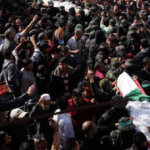Conversing with Allāh
Part 1 | Part 2 | Part 3 | Part 4 | Part 5 | Part 6
Duʿā 3
رَبَّنَا إِنَّنَا آمَنَّا فَاغْفِرْ لَنَا ذُنُوبَنَا وَقِنَا عَذَابَ النَّارِ
“Our Lord. We have indeed believed, so forgive us our sins and save us from the punishment of the fire.” [1]
Realising the context of this Duʿā will help us appreciate its significance, for it appears amidst a string of verses where Allāh relates the many different ambitions that people have in life today. In the build-up of the Duʿā, Allāh said:
زُيِّنَ لِلنَّاسِ حُبُّ الشَّهَوَاتِ مِنَ النِّسَاءِ وَالْبَنِينَ وَالْقَنَاطِيرِ الْمُقَنطَرَةِ مِنَ الذَّهَبِ وَالْفِضَّةِ وَالْخَيْلِ الْمُسَوَّمَةِ وَالْأَنْعَامِ وَالْحَرْثِ ۗ ذَٰلِكَ مَتَاعُ الْحَيَاةِ الدُّنْيَا ۖ وَاللَّهُ عِندَهُ حُسْنُ الْمَآبِ
“Beautified for people is the love of that which they desire – of women and sons, heaped-up sums of gold and silver, fine branded horses, and cattle and tilled land. That is the enjoyment of worldly life, but Allāh has with Him the best return.”
The āyāt continue:
قُلْ أَؤُنَبِّئُكُم بِخَيْرٍ مِّن ذَٰلِكُمْ ۚ لِلَّذِينَ اتَّقَوْا عِندَ رَبِّهِمْ جَنَّاتٌ تَجْرِي مِن تَحْتِهَا الْأَنْهَارُ خَالِدِينَ فِيهَا وَأَزْوَاجٌ مُّطَهَّرَةٌ وَرِضْوَانٌ مِّنَ اللَّهِ ۗ وَاللَّهُ بَصِيرٌ بِالْعِبَادِ
Say, “Shall I inform you of something better than that? For those who fear Allāh will be gardens in the presence of their Lord beneath which rivers flow, wherein they reside eternally, and purified spouses and approval from Allāh. And Allāh is Seeing of His servants.”[2]
We are told that what the latter category of people yearn for—Jannah and Allāh’s acceptance—is far greater than the aspirations of the first category. Who are such great people? What are their qualities? Allāh gives us part of their description, saying:
الَّذِينَ يَقُولُونَ رَبَّنَا إِنَّنَا آمَنَّا فَاغْفِرْ لَنَا ذُنُوبَنَا وَقِنَا عَذَابَ النَّارِ
“Those who say: ‘Our Lord. We have indeed believed, so forgive us our sins and save us from the punishment of the fire.’” [3]
Let us take a closer look at this Duʿā which, according to Allāh, was one of the vehicles that allowed the people of success to arrive into Jannah.
Notice how their Duʿā was introduced with the particle of emphasis; “Inna” / “Indeed”. In other words, their Tawhīd (monotheism), īmān (faith) and Yaqīn (certainty) are so firm and pure that every iota of doubt, disbelief and insincerity has been evicted.
Then the letter “fa” / “so” is used—a letter of causality—used when something happens as a result of something else, thus they are essentially saying: “Due to our unwavering belief in You, O Allāh, we implore you to erase our sins.”
Does this mean that we are actually allowed to call upon Allāh by virtue of our good deeds?
The answer is yes and this āyah is one of the many evidences for it. The Prophet (sallAllāhu ʿalayhi wasallam) also informed us of three men whom, at some point and place in the past, sought shelter within a cave which they would then be trapped within. They said to one another:
إِنَّهُ لاَ يُنْجِيكُمْ مِنْ هذِهِ الصَّخْرَةِ إِلاَّ أَنْ تَدْعُوا اللهَ بصَالِحِ أعْمَالِكُمْ
“Nothing will save us from this boulder [that had sealed the cave’s exit] other than making Duʿā by means of our good deeds.”
The first made a Du’ā, mentioning within it how dutiful he was to his parents. The second made a Duʿā, mentioning with it how he suppressed himself from acting upon an impermissible sexual desire, whilst the third made a Duʿā, mentioning with it how honest he was in paying back his dues within the world of business. As a result, Allāh answered their Duʿā, the rock was moved from its place and they made a safe escape.[4]
Also read: Three Men and a Cave
So using one’s good deeds in the context of Duʿā is praiseworthy, and what greater good deed is there in existence than that of īmān? This is precisely what the Duʿā above entails.
“Our Lord. We have indeed believed, so forgive us our sins and save us from the punishment of the fire.”
Do the same in your Duʿā:
“O Allāh, I am dedicated to my five daily prayers and will, inshā’Allāh, die upon them, so erase my sins.”
“O Allāh, since the day you guided me, I haven’t neglected my Hijāb – the true Hijāb – and so flood my heart with īmān.”
“O Allāh, I have avoided every impermissible money-making opportunity despite how easy they are, so compensate me and provide for me in ways that shall thrill me.”
On the face of it, this format of Duʿā may seem to be negative—“Mann”; bringing to light our “favours” upon Allāh—which is undoubtedly blameworthy. In reality, however, it represents humility and submission to Allāh, but one should pay attention to the wording of one’s Duʿā in order to avoid the negative format. In other words, “Mann” would be along the lines of –
“O Allāh, allow me to enter Jannah because I prayed/fasted/gave in charity,” and so on.
The correct wording would be –
“O Allāh, I have prayed/fasted/given in charity, and so I ask you to allow me access to Jannah.”
Returning to the Duʿā:
“Our Lord. We have indeed believed, so forgive us our sins…”
The Arabic term used for “forgive” in the Duʿā is “Faghfir”, the root of which has meanings pertaining toالتغطية والستر—covering and concealing.
Thus the verb for dyeing hair, in Arabic, is “Ghafara” for it has covered grey hair and concealed it. Similarly, the helmet which the combatant wears is referred to as a “Mighfar”, for it conceals his head and spares him from harm. [5]
Thus, in this Duʿā, you are asking Allāh to cover your sins, to not disgrace you by them by making them public, and to spare you from their disastrous consequences in both worlds.
You are saying:
“O Allāh, cover my mistakes, do not embarrass me by my crimes, spare me from their harm, and do this for both my minor and major sins, my first and last ones as well.”
Do you see the value of this Du’ā?
Furthermore, the fact that the mentioning of īmān and the forgiveness of sins appear side by side shows the reality of their unbreakable relationship, for the stronger one is in īmān, the more likely one’s Duʿā will be answered and the more likely that one’s crimes will be forgiven. With this we understand how it is that two people may make the exact same Duʿā but the outcome varies enormously.
Returning to the Duʿā:
“Those who say: ‘Our Lord. We have indeed believed, so forgive us our sins and save us from the punishment of the fire.’”
When you ask for protection from the hellfire, think about the implications of this request, as it also includes every element that may lead to the fire; prohibited sources of income, prohibited relationships, sinful habits, bad companionship, ill manners, insincerity, hypocrisy, backstabbing, injustice, and the list is endless. All of this is captured by the request of “and save us from the punishment of the fire.”
Benefits to keep in mind:
1) The Muslim is not shy of his/her Islām
The fact that this Duʿā is introduced with “Our Lord. We have indeed believed” indicates beyond doubt just how proud the utterers of this Duʿā are with their Islamic identity. Muslims announce their īmān not only through their words, but via their distinct behaviour as well, their unique dress code, their exclusivity in speech, their insistence on prayer time and space, their version of a good time on the weekend, and so on.
“Who is better in speech than the one who calls to Allāh, and does good deeds and says I am from the Muslims?”[6]
2) The prospect of hell for anyone is not farfetched
According to the Qur’ān, this Duʿā belongs to those who desire paradise! They are working relentlessly for it, shedding sins for it and begging Allāh in desperation for it, and despite these matters combined, they genuinely believe that the prospect of hellfire, for them, is a real possibility. Thus, one of the clearest signs of a true believer is uncovered: distance from every form of self-admiration.
3) Recall those sincere deeds of yours
Take inspiration from this Duʿā, in that when you make your own, recall those good deeds of yours that you are sure were purely for His sake, not seeking the pleasure or approval from anyone but Him. This exercise will also bring to light just how few those deeds are in our lives, yet it is only this quality of deeds that Allāh will accept on the Day of Judgement tomorrow, and will answer Duʿā through them today.
In the next article of this series we will—inshāAllāh—cover the fourth Duʿā. This will be for the benefit of those who have, or wish to have, children at some point in their lives.
[donationbanner]
Source: www.islam21c.com
Notes:
[1] Al-Qur’ān 3:16
[2] Al-Qur’ān, 3:14-15
[3] Al-Qur’ān 3:16
[4] Bukhari and Muslim, on the authority of Ibnu ‘Umar
[5] Lisaanul ‘Arab
[6] Al-Qur’ān, 41:33









